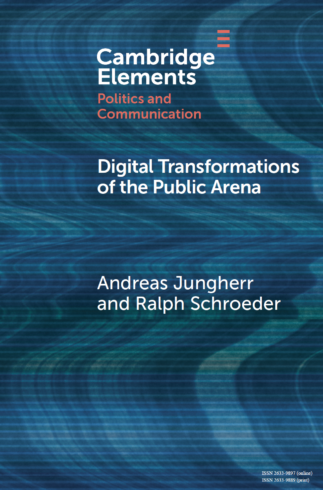“Digital Transformations of the Public Arena,” my new book with Ralph Schroeder is live (and free to read for 3 weeks)!
We present a new framework for thinking through how digital media have changed politics, public discourse, and contestation. To understand these changes, we must focus on the nature, drivers, and effects of digital communication infrastructures that provide the public arena.
To do this well, we need to compare how structures host and shape discourses in different contexts. We analyze the transformation of the public arena in China, Germany, and the US, three countries with different constellations of media, political, and economic systems.
The public arena consists of the media infrastructures that enable and constrain the publication, distribution, reception, and contestation of information that allow people to exercise their rights and duties as citizens.
These infrastructures mediate the relation between citizens or civil society on the one hand and political elites or the state on the other.
In the past, predominantly print or broadcast media provided societies with the public arena. Today, these traditional structures are challenged in their importance – if not downright replaced – by digital media that have transformed the public arena as we knew it.
Changes brought about by digital media have led to a set of tensions that actors in the public arena must navigate: Traditional gatekeepers find themselves challenged or replaced. New processes that shape the limited attention space create anxieties and demand for transparency and public negotiation.
The rules governing the visibility and reach of actors and content in the public arena need to get (re)negotiated or newly developed considering the affordances of new communication infrastructures.
We also must account for the increasing importance of the geopolitical aspects of companies (most of them based in the US or China) providing digital infrastructures to many different countries with widely diverging cultures, discursive norms and practices, and political systems.
All of this happens while the legitimacy of structures providing the public arena and actors shaping it is increasingly contested by sizeable minorities.
Understanding these changes and tensions within the public arena is of great importance. Societies face grave challenges. Causes and solutions to challenges provided by climate change, globalization, or pandemics are all discussed in the public arena.
Societies’ ability to answer challenges like climate change, globalization, or pandemics depends on the workings and legitimacy of communication infrastructures that provide and shape the public arena and through it discourses.
We are very excited and humbled to feature and build on prior work by so many amazing scholars. One of the most gratifying features of working on the impact of digital media on society is the vibrant and highly supportive community of researchers sharing these interest and concerns!
We hope to provide a window to the rich discussion on the impact of digital media and to offer a helpful framework for future work. Understanding the underlying questions is deeply important to positively influence contemporary societies.
This work has just begun!

